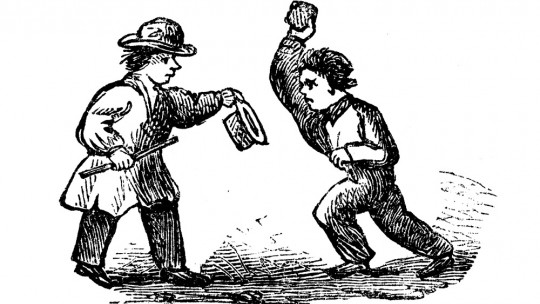Do you usually avoid conflicts with others? How can we deal with a confrontation according to psychology? Discover how to face the fear of conflict and say what you really think.

He fear of conflict It is a common problem, especially in those people who suffer from social anxiety. In fact, a person with this fear often avoids conflict because they are excessively worried about saying or doing something that will upset others. In these cases, although avoiding confrontation can relieve anxiety in the short term, in reality in the long term the fear of facing these situations is perpetuated, which ends up creating problems in relationships and on a personal level. So how can we confront the fear of conflict?
Why should we face problems with others?
People who feel anxiety or fear when confronted with others are often unwilling to give their opinion or say their thoughts when they are different. In fact, this fear of people and their reactions to our comments can make us end up doing almost anything to avoid conflicts with others.
The drawback of not face these problems is that learning to have positive conflict and argue with others in a healthy way is a key part of adult life, from facing disagreements in a relationship to defending yourself or showing a different opinion at work. Therefore, facing this fear is vital so as not to hinder our personal, emotional and professional life.
When is this fear a problem?
When a person avoids the slightest confrontation, they are compromising their true feelings and accumulating frustrations that can end up negatively affecting their physical and mental health. In this way, a false reaction, instead of recognizing our emotions or thoughts, can end up leading to feelings of loneliness and depression.
Avoid conflicts It also affects our relationships because we are cutting off all honest communication with the other person. While this behavior may seem like the best way to deal with the fear of conflict, the reality is that this avoidance can end up damaging relationships with others and with ourselves.
How to face the fear of conflict?
If you think you are one of those who tends to avoid conflicts, it is important that you try to face problems in a more assertive way. One of the best ways to do this is precisely by going to therapy with a professional psychologist. In addition, we recommend that you keep the following in mind to learn how to deal with the fear of conflict:
- Stop reacting and start responding: Instead of filling in the blanks with imagined ideas of what a phrase or action means, ask. There are many occasions that people with a fear of conflict They tend to chronically avoid them, even without realizing it. To be able to face this problem, it is important to deactivate this almost instinctive reaction to change it for a more measured and thoughtful response.
- Start saying ‘no’: One of the most common manifestations when people tend to avoid conflicts is that they usually have problems saying ‘no’ to others. The reason for this is that sometimes refusing to carry out a request from others can mean facing the fear of conflict. Therefore, one of the ways to deal with the problems related to it is to start saying ‘no’ in small situations. This way, you will slowly build a bridge to deal with the confrontation.
- Let go of emotions: Instead of focusing on what you feel, if you have to To face a problem With others, try to be as objective as possible. It is normal to be afraid of conflict if it means being defensive or feeling attacked by others. In these cases it is a good idea to try to use more objective language and make requests of others about how you would like things to be. Putting emotions aside and explaining the problem rationally will make it easier for you to stop avoiding conflicts with others.

- Change perspective: It usually happens that in the discussions with others Many people may have a tendency to defend their point of view very passionately. When this happens, instead of thinking that this means confronting the person, think that, in reality, you should not put yourself in the same position. Instead, try to stop seeing the argument as a battle and try to convince the other person that you believe your point of view through your arguments. Remember that in an argument there is neither a winner nor a loser.
- See disagreements as thinking: Many people have the idea that when they are in a confrontation or argument with others, they are dealing with their beliefs and ideals. This is actually not the case, since we do not have to identify with our thoughts, even though we believe they are reality.
- Make a plan: If you tend to experience very often the fear of conflict, one of the best ways to deal with it is to try to have a plan when this happens. This way, if you disagree with a person and you think it would be beneficial for both of you to tell them, you can rehearse before taking the step.
- Use mindfulness to relieve stress: Normally, people who tend to face the problems By avoiding them, they tend to get stressed when these types of situations arise. To prevent emotions from taking control and making us feel too stressed, you can try to focus on the sensations you feel in those moments. This will help you maintain control in times of tension and remain more relaxed.
- Recognize and manage your feelings: Being aware of how emotions affect us can help you know more about yourself as well as others. In this case, to face the problems and put aside the fear of conflict, you should try to examine and question your feelings. Instead of focusing on the emotions, understand the reason for these sensations and the negative thoughts that are associated.
- Solve the problems and don’t think about them so much: Many people with fear of conflict They usually have the habit of ruminating, constantly turning over the thoughts or ideas that come into play in these situations. Before you allow these spirals to grow in your head, try taking a much more assertive approach.
Saying what we think and facing problems in the moment is key to having a better relationship with others and with ourselves. For this reason, it is never an alternative avoid conflicts when this entails damage to our mental health.








